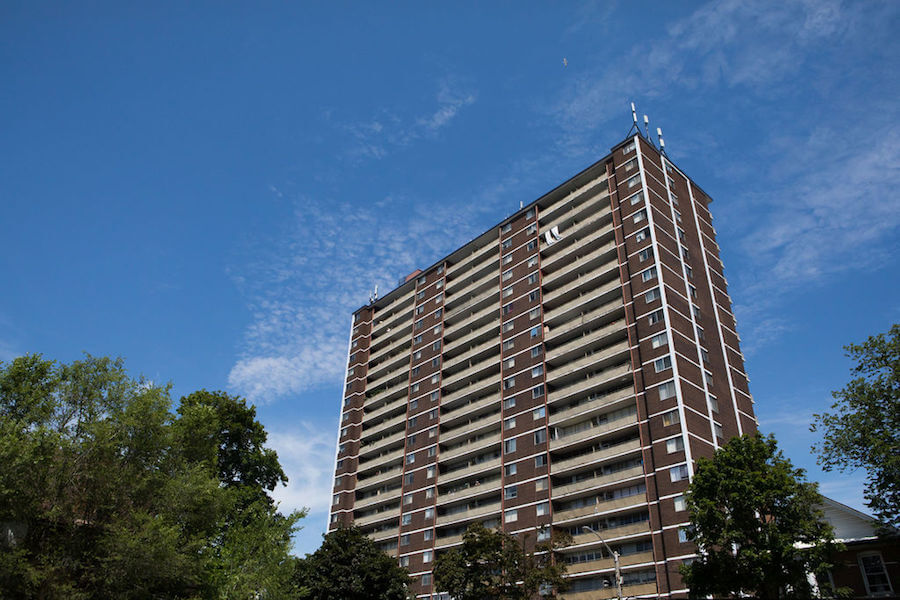
After losing so much already this year – jobs, incomes, and even loved ones – thousands of Ontario renters are finding themselves at the mercy of the Landlord and Tenant Board (LTB) and desperately fighting to not lose their homes.
Already plagued by long delays before being shut down in March due to COVID-19, the LTB is plowing through a months-long backlog of disputes and eviction hearings – procedural fairness and human rights be damned.
The onslaught has created a laundry list of issues that are preventing tenants from participating in hearings and getting a fair shake, which is a right guaranteed to them under legislation.
All hearings are currently being held online, creating a significant barrier for low-income tenants that do not have access to technology or tenants with disabilities that cannot fully participate via video conferencing or over the phone.
A large number of notices of hearings have either been delayed or lost entirely in the mail, creating chaos and confusion – not to mention, setting up impossible timelines for tenants to prepare their case.
Legal representatives are buckling under the weight of the number of hearings, attending several a day without adequate time to meet with their clients or prepare arguments. Many renters have been left with little option but to move forward with their hearings with no legal representation.
To top it off, tenants are unable to make fairness arguments to dispute their eviction, which the LTB is required to consider under the Residential Tenancies Act.
The economic crisis caused by COVID-19, the fact that government supports like the Canadian Emergency Relief Benefit are not dollar-for-dollar income replacements, and the particular lockdown status of a city would all be highly relevant to fairness considerations.
This is in stark contrast to how things used to run at the LTB.
While it was by no means a perfect system before moving online, the LTB could at least be relied on to follow its general principles of administrative justice. Tenants used to have time to access legal counsel, prepare documentation, and make accommodation requests, all in advance of their hearing. Mediation was also available for tenants and landlords, rather than face the blunt instrument of eviction.
There are good reasons why these policies and procedures exist: losing your home is one of the most devastating life experiences – just ask anyone who’s been through it. International law recognizes eviction as a violation of human rights where access to justice is denied or where the eviction might lead to homelessness.
The processes in place at the LTB exist to protect vulnerable tenants. The recent “streamlining” of processes to address the backlog has come at the expense of these essential procedural protections.
While the LTB has been criticized for moving slowly in the past – a situation that was not helped by being woefully understaffed – moving slowly is not necessarily a bad thing when the decisions adjudicators make can fundamentally change (and ruin) lives.
By now, our governments are well aware of the long-lasting consequences of evicting people from their homes, not to mention the financial strain it places on other government services like our shelter systems. Eviction is a traumatizing experience that, like loss of employment and chronic poverty, can have serious physical and mental health consequences.
Evictions now would only increase tenants’ vulnerability to COVID-19, especially if the tenant has to live in a congregate shelter or double up with families or friends while looking for a new place to live.
The consequences of making decisions at the LTB are serious for landlords, certainly, but can be life-altering and life-shattering for tenants. Eviction notices that aren’t served properly, having a bad phone connection or being unable to locate the mute button on Zoom – these are all things that can now be the difference between whether someone keeps their home or becomes homeless.
Until such time as the government can ensure the basic procedural rights guaranteed to Ontarians under law, a moratorium on evictions should be reinstated. In addition, a more sustainable solution for the many Ontarians facing the loss of their home is required, such as a rent forgiveness program or a grant-based rent bank.
A motion passed in the Legislature is calling on the Ontario government to both reinstate the moratorium and prohibit eviction for nonpayment of rent during the pandemic. However, with the Legislature on hiatus until mid-February, an emergency order is needed for the moratorium to come into effect.
Pressure to move quickly is not worth the risk to people’s lives, nor is it worth what it is doing to undermine fundamental human rights. With a global pandemic and widespread job losses layered on top of a decades-long housing crisis, there has never been a time where the LTB should be moving more carefully.
Leilani Farha is global director of The Shift and former United Nations Special Rapporteur on the right to housing (2014–2020). Alyssa Brierley is the executive director and general counsel of the Centre for Equality Rights in Accommodation (CERA).












